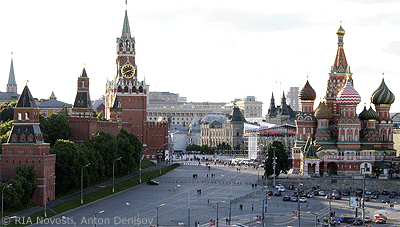Russian Cultural Figures Targeted as New Opposition

(Moscow Times – themoscowtimes.com – Ivan Nechepurenko – September 2, 2014) With Russia’s political opposition either sidelined or splintered over Russian policy in Ukraine, dissenting cultural figures have become the new focus of pro-Kremlin witch hunts, with state media treating them as a political force and accusing them of treachery.
The practice has echoes of Soviet times, when cultural figures perceived as a threat to the regime, such as Nobel Prize winners Boris Pasternak and Joseph Brodsky, were subjected to vicious smear campaigns.
On Sunday, the Gazprom-owned NTV national television channel broadcast an episode of its “Profession: Reporter” news show portraying an array of Russian writers, musicians, journalists and entrepreneurs as belonging to a “fifth column” of subversives bankrolled from abroad.
Sunday’s show was called “17 Friends of the Junta,” a reference to how Russian state-run media describes the Ukrainian government following a regime change prompted by mass street protests there earlier this year. The Kiev authorities are also frequently referred to as a “fascist regime” installed following an unconstitutional coup that ousted legally elected Ukrainian President Viktor Yanukovych.
Together with “13 Friends of the Junta” – the first episode of the series aired a week earlier – the program targeted prominent Russian artists such as writer and poet Dmitry Bykov, veteran rock singer Andrei Makarevich and hip-hop artist Noize MC.
NTV is well known as a vehicle for smear campaigns targeting dissenting individuals and organizations, having previously aired scandalous reports about prominent opposition members such as Boris Nemtsov and Ilya Ponomaryov and accused the Golos election monitoring NGO of being on the CIA’s payroll.
“Profession: Reporter” was NTV’s most popular program in the week of Aug. 18-24, when the first episode was shown, according to the TNS Russia media research firm. The data for the last week was not available at the time of publication. The NTV channel itself is consistently ranked among Russia’s top three federal television channels. The program’s authors and producers were not listed.
Fractured Opposition
Cultural figures have sometimes featured in similar reports before, but became the focus only in the most recent TV mudslinging campaigns.
According to Alexander Morozov, head of the Moscow Center for Media Studies, in a situation when the opposition is almost extinct in Russia, cultural figures have been identified as a potential threat to the government.
“There is currently no opposition. It has been dispersed and destroyed. What the opposition was before is now looking for a new identity and sense of direction,” Morozov told The Moscow Times.
“At the same time, there are cultural figures, writers and artists who believe that the Kremlin’s Ukraine policy is too chaotic and could damage the country. Their voices are being heard, and this invites government criticism,” he said.
Backlash of Support
One of Russia’s most prominent contemporary writers, Dmitry Bykov, was listed in the program as an “anti-patriot” who “converts lines of poetry into rubles.”
In particular, Bykov was accused of going to Kiev to attend the “Ukraine-Russia: Dialogue” forum in April. The forum was organized by Mikhail Khodorkovsky, a former oil tycoon who spent more than 10 years in prison on charges of embezzlement and tax evasion that his supporters say were trumped up for political reasons, and who has become a symbolic figure for Russia’s opposition during the last decade.
Bykov reacted to the accusations made against him with wry humor.
“In these times we live in, the less NTV likes you, the more you are liked by honest people,” he told The Moscow Times in a phone interview.
“They have allowed people to do anything they like with us and declared us essentially illegal, but they have failed, as instead of public condemnation we are receiving signs of support,” he said.
History Repeating
The current situation has parallels with Soviet times, when writers, musicians and other artists were often forced to join the Communist Party or get involved in politics in other ways. Some, such as “And Quiet Flows the Don” author Mikhail Sholokhov, acted in support of the Soviet regime, while others, such as Alexander Solzhenitsyn, were hounded and forced to emigrate.
The Soviet government widely used the label “antisovetchik” (anti-Soviet) to brand individual artists that it perceived as opposing society.
“There is a typological similarity, but the difference is that in Soviet times it was not possible to express your opinion to a wide audience,” Morozov said.
“It is important to see what the new political season in September will bring: whether the decision will be to suppress dissenting voices and mobilize for an imaginary war with NATO or not,” he said.
